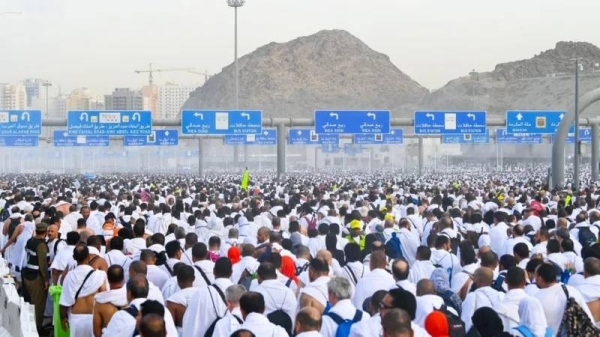At least 14 Jordanian citizens have died during the annual Hajj pilgrimage in Saudi Arabia due to extreme heat conditions.
The Jordanian Foreign Ministry confirmed that these deaths were caused by sunstroke amid a severe heat wave, while an additional 17 Jordanian pilgrims have been reported missing.
Authorities are currently conducting searches to locate them.
The announcement underscores the significant challenges posed by the extreme weather during this year’s Hajj, one of the largest mass gatherings in the world.
According to Saudi officials, over 1.8 million pilgrims are participating in the pilgrimage this year.
The intense heat has not only affected Jordanian pilgrims.
The Iranian Red Crescent has also reported the deaths of five Iranian pilgrims, though the specific causes of their deaths were not disclosed.
Hajj, an annual Islamic pilgrimage to Mecca, is mandatory for all Muslims who are physically and financially capable of undertaking it at least once in their lives.
It involves several days of rituals, including prayers and the symbolic stoning of the devil, performed in crowded conditions that can exacerbate the impact of high temperatures.
Historically, Hajj has seen various tragic incidents, including deadly stampedes and tent fires.
However, the primary challenge most years remains the intense heat, which can lead to heat exhaustion and heat stroke among the pilgrims.
The Saudi government has made numerous efforts to improve safety and manage the risks associated with the pilgrimage, including enhancing medical facilities and implementing measures to prevent overcrowding.
Despite these efforts, the extreme temperatures continue to pose a significant health risk. Pilgrims are often exposed to the harsh desert climate, with limited shade and hydration opportunities during the rituals.
In light of the recent deaths, both Jordanian and Iranian authorities are urging their citizens to take extra precautions.
The Jordanian Foreign Ministry has called for increased awareness about the dangers of sunstroke and the importance of staying hydrated and seeking shade whenever possible.
The Saudi health authorities have also been on high alert, providing medical assistance and advice to pilgrims.
They have set up numerous cooling stations and distributed water and electrolyte solutions to help prevent heat-related illnesses.
As the Hajj continues, the focus remains on ensuring the safety and well-being of the pilgrims.
The international community is closely monitoring the situation, offering condolences to the families of those who have lost their lives and supporting efforts to locate the missing individuals.
In conclusion, the tragic deaths of 14 Jordanian pilgrims due to intense heat during the Hajj pilgrimage highlight the ongoing challenges posed by extreme weather conditions.
As the search continues for the missing Jordanian pilgrims, the incident underscores the critical need for continued vigilance and robust safety measures to protect the millions of participants in one of the world’s largest religious gatherings.
For more news https://thebeat99.com/news/







